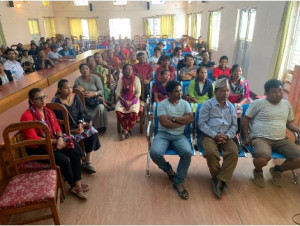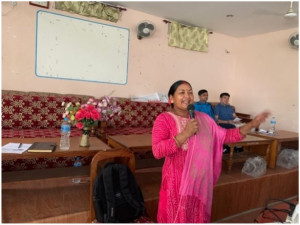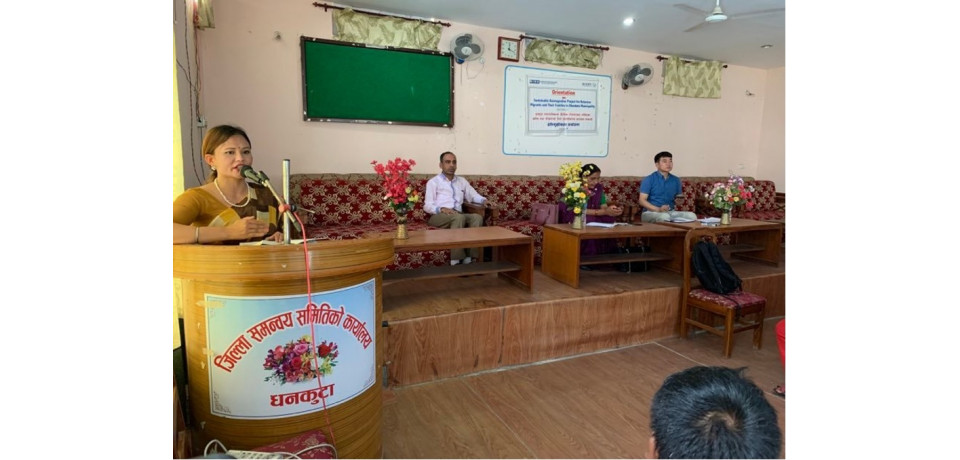Business Training Facilitates Returning Migrants’ Sustainable Reintegration in Dhankuta, Nepal
Objetivos de Desarrollo Sostenible Relacionados y Objetivos del Pacto Mundial sobre Migración
During COVID-19, many migrants including Nepali migrants living and working abroad faced challenges in accessing services, lost their jobs and faced increased physical and mental health challenges when the countries where they were living locked down or faced mobility restriction. As a result, more than 1 million migrants returned to Nepal through various point of entries. But returning home is often challenging; returning migrants must find new jobs suited to the skills and the new experiences they gained when abroad, and sometimes it can be difficult to find one’s place in the community again. To empower and listen to those returning, IOM , with the support of the Dhankuta Municipality in Nepal and Province 1 authorities, are implementing the RAM Project to provide entrepreneurship and business startup tools as well as psychosocial support, ultimately creating new opportunities for all Nepalese.
As a part of this project, the Nepal Institute of Development Studies (NIDS) organized a 2-day training programme in Dhankuta Municipality from 10-11 July 2022 to build the capacities of returning migrants and to orient them towards existing available services.

Training was provided for returnees on business incubation, primarily for community members who were building small farms and agricultural businesses. Specialized Livestock Development and Agricultural Development Officers taught classes on livestock development and agriculture issues to the participants. Those who attended found these good practices to be extremely useful and requested further support and similar initiatives, so to continue the momentum, more training sessions on these topics are being planned by NIDS. Additional sessions were provided during the training to highlight existing psychosocial services and to encourage returnees and community members to access support throughout the municipality.

This community event, as well as the wider project in Province 1, showcase how local leadership is essential in order to build activities into existing services, institutions and approaches of a community for long term sustainability. Leaders from across Dhankuta came together during this training, including the Deputy Chief of Dhankuta District Coordination Committee, Deputy Mayor of Dhankuta Municipality, and Deputy Superintendent of Police (DSP) of District Police Office Dhankuta, to reaffirm their commitment to providing continuous support for returning migrants after this project ends. Leaders highlighted the government’s responsibility to ensure the sustainability of the programme, appreciating the UN-local-national government partnership, and laid out plans for the municipality to broaden services, including expanding market access to new businesses.
Training and support services like this one bring the entire community together and empower those who are may otherwise risk being left behind. In order to reduce inequalities (SDG 10), reduce poverty (SDG 1), provide decent employment (SDG 8) and create prosperous societies, we must harness everyone’s skills and potential. Returning migrants have learned much on their migration journey and returned with new innovative ideas, new perspectives and new strengths such as adaptability, flexibility and independence. Sustainable economic reintegration, livelihoods and self-employment support – led by and for local communities – empowers migrants and their families to contribute these rich experiences to building stronger neighborhoods.
This training programme is organized within the framework of the Global IOM-UNDP Joint Programme on Making Migration for Sustainable Development (M4SD) funded by the Swiss Agency for Development and Cooperation (SDC). The Programme is implemented in 11 countries, including Nepal, and aims to harness the development benefits and reduce the negative effects of migration for host and home communities, migrants and their family members. Learn more about the M4SD Programme here.
